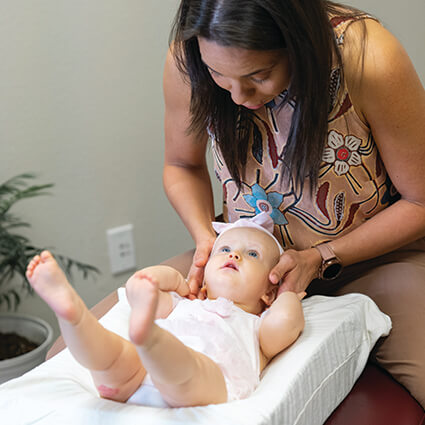Care for Latching Difficulties in Winter Springs & Oviedo
Supporting Successful Feeding for Your Baby

Breastfeeding challenges can be frustrating and concerning for both Mother and Baby. We recognize the delicate nature of these difficulties and provide gentle, effective care to help your infant overcome latching issues.
The most common indication of a latching problem is when your baby struggles to latch onto one particular side. You might also notice your infant cannot fully attach to the nipple regardless of position, often due to limited oral control caused by tongue-ties or fascial tension in the mouth.
What to Expect
Why Is My Child Having These Problems?
Birth processes significantly impact your baby’s ability to latch properly. Assisted births, including C-sections, forceps deliveries, or extractions when a baby stops in the birth canal, can place tremendous pressure on your infant’s neck tissues. Studies show this pressure may reach up to 90 times normal levels for a brief moment—enough to cause pulling on the fascia surrounding the skull and mouth.
Additionally, pressure on the brainstem at the base of the skull can compromise the cranial nerves responsible for jaw and tongue movement. These nerves control the reflexes needed for proper latching. When compromised, function becomes either overactive or underactive.
Our Gentle Approach to Wellness
We use INSiGHT™ scanning to identify areas of inflammation precisely, then address misalignments through gentle, sustained holds—using approximately five pounds of pressure, similar to testing a tomato’s ripeness at a grocery store. This gentle technique realigns cranial bones and relieves pressure on the nervous system.

Early Intervention Is Essential
Addressing latching difficulties promptly is crucial. Latching problems can be one of the earliest signs of potential developmental delays. Your baby’s brain experiences its most rapid growth during the first year of life. Misalignments at the skull and brainstem level can restrict proper development if the brain cannot correctly process sensory input from the environment.
If not addressed, these issues can progress to other problems, including spitting up, fussiness, colic, constipation, and diarrhea—all connected to brainstem function.
Get Help for Your Little One Today
Contact Dr. Liz at Mojica Chiropractic Care today to schedule a gentle assessment for your baby. Early intervention can significantly affect your infant’s comfort, feeding success, and overall development.
CONTACT US

